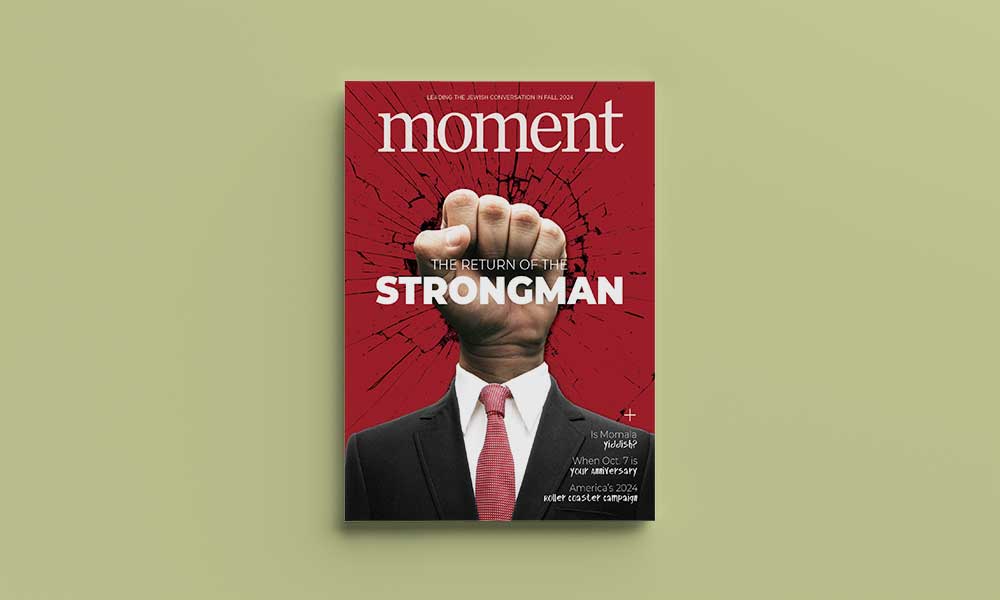SOME OF US WANT THIS NETFLIX ROM-COM
Megan Naftali’s defense of a popular but controversial Netflix show (“Nobody Wants This Has Rubbed Many Jews the Wrong Way. They’re Missing the Point”), drew strong reactions from readers and was the most-read article at momentmag.com for several weeks. The show is set in Los Angeles and is centered around Noah, a rabbi, and Joanne, a non-Jewish podcaster.
Some readers denounced the show for its embrace of Jewish stereotypes. “With antisemitism rearing its ugly head in so many places, I cannot applaud humor based on the very stereotypes which contribute to that dangerous trend,” Harriet S. Katz said. Others didn’t find it offensive. “Certainly there are stereotypes, but what show or movie depicting a particular ethnic group doesn’t have them?” Rabbi Michael Swarttz asked.
The show’s portrayal of Jewish women was another point of contention. “I guess the writers wanted to justify why nice Jewish men are so easily swayed away from obnoxious Jewish women!” Brad H. Feig said. David Cohen shared that he’s known “many Jewish women who behaved similarly to the show’s. I observed quiet Jewish men, accepting and eternally loving their domineering wives,” he said, adding, “My shiksa wife of 45 years and I watched this series in three evenings.” The use of the word “shiksa” also made waves. “Stop it. Just stop it. The word ‘shiksa’ is offensive and should simply never be used,” Matt Axelrod said.
One commenter, Mark, has hopes that season two of the show will touch upon important issues between the couple. “I hope that it allows Joanne to grapple with Judaism in a realistic and serious manner and understand that, unless she converts and genuinely embraces Judaism, she really should not be with Noah,” he said.
Nobody Wants This certainly opened a dialogue about what is permissible in portraying the Jewish community on the screen. “Is there a one-size-fits-all approach to creating content that will appease everyone?” Naftali asked, adding that the announcement of another season suggests that “clearly, somebody wants this.”
FALL ISSUE
A SINGULAR MOMENT
The fall issue of Moment was a treasure trove of just how Jewish Americans might be able to negotiate the impending governmental challenges (and changes) both at home and abroad; a revisiting of what the spectrum of Judaism is all about; how the so-called strongmen of the past (and present/future) lure wannabe believers; and, finally, how diverse roller coaster riders planned to vote in the presidential election. No present publication can equal the foregoing shares. Thus—thanks!
Bill Younglove
Lakewood, CA
LITERARY MOMENT
KISS HER, SHE’S BOTH!
I so loved reading “Kiss Me! I’m Jewish and Irish!” (Fall 2024), Robert Siegel’s dual review. Although my name is totally Jewish, as was my upbringing, and I have worked in the Jewish world for over 30 years, I am both Jewish and Irish. My German Jewish, Cincinnati-born grandmother married an immigrant Irishman in 1910—when, according to Hasia R. Diner, things were cordial between the two groups. They met in the subway when the door closed on his hand, and she visited him in the hospital. But the marriage was fraught and they separated when my mother was a teenager. In 1934, when things had somewhat soured between Jewish and Irish Americans, my mother, a beautiful redhead, married a Jewish man (my father), and her Irish dad disowned her. “I would rather see her dead,” he apparently told a family friend. Those were the days.
Judith Ginsberg
New York, NY
MOMENT DEBATE
2¢ OF CONTEXT
I was surprised at the lack of historical context in the last “Moment Debate” (“Can Jews ever Flourish under Authoritarians?” Fall 2024), so I’ll add my two cents’ worth.
From the late 17th century to the late 20th century, the American South was continuously one of the most tyrannical and authoritarian regions of the Western world. Chattel slavery and Indian annihilation claimed millions of lives. Jews thrived and experienced little fearsome antisemitism. They maintained their religious and cultural identity but were simultaneously able to assimilate into middle-class business and professional life in ways they could not anywhere else in the Western world, at least over such a long period of time. As a youngster growing up in Texas, I was familiar with the oft-repeated phrase of Sam Rayburn, the long-time speaker of the House of Representatives: “If you want to get along, go along.” I always assumed it was a bit of advice translated from Yiddish. Regardless, it captured—and I think still captures—political views of Jews in the United States and elsewhere.
Malcolm M. Feeley
Berkeley, CA





